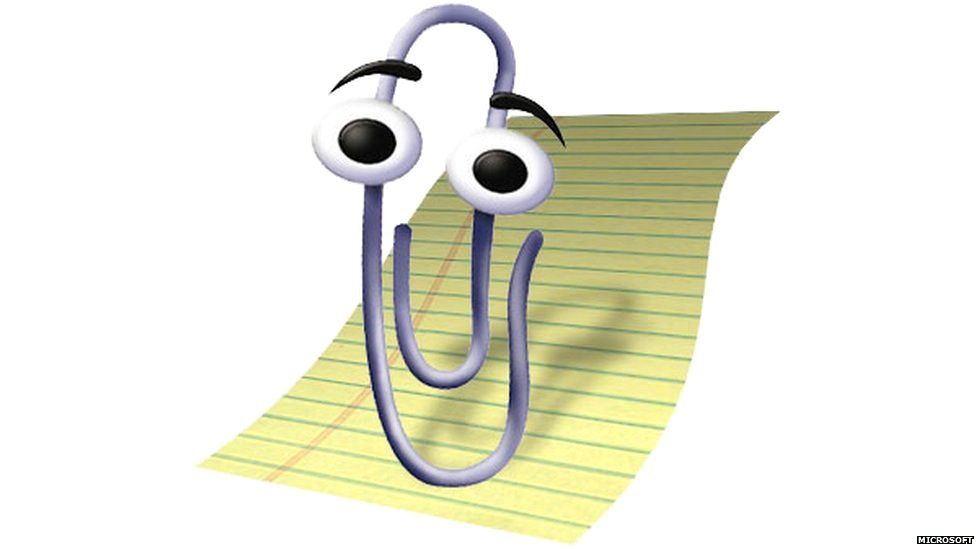Clippy to Allo: A history of virtual assistants
- Published

As tech-geeks get their first look at Google's new virtual assistant, Newsbeat's been looking back at the highs and lows of technology that lets machines talk back.
As well as answering your questions, the recently unveiled Google Assistant will also combine with an app called Allo, to come up with entire sentences for you.
See a picture of a dog on Facebook?
The assistant will suggest "cracking German Shepherd mate!"
Get a DM from a hungry friend? It will search restaurants.
It's the latest in a string of recent developments to virtual assistants - but the technology's beginnings are much less impressive.
With the help of Stuff Magazine's Rob Leedham, we've gone back to where it all started.
Search Engines
Today's virtual assistants are more advanced versions of search engines like AltaVista, which was launched back in 1995.
It couldn't do much except search for words on web pages - but this was apparently exciting at the time.
Then Ask Jeeves came along, and had a huge impact.
The big difference? Instead of just putting in search terms, you asked the internet a question, and you got an answer.
As Rob puts it, it was a "more natural process, where you interacted directly with the machine".
Clippy
By 1997, Ask Jeeves had inspired a more ambitious, but much more irritating creation.
Microsoft's Clippy was a moving paperclip which used to pop up from your desktop and make suggestions for what you might like to do.
So if you opened up a Word document and typed "dear", he'd try to format your page as a letter.
The problem? He was incredibly unpopular. So much so that he's still got his own meme.
"Well, it was pretty annoying, wasn't it?" Rob explains.
"It just kind of popped up all the time and didn't do anything useful.
"In the 90s, AI systems weren't very advanced. Clippy was annoying because it was omnipresent and it couldn't really do much that was helpful."
The dark years
If you've never spent any time with Clippy, you're probably thinking, "How annoying can one paperclip be?"
Well, so annoying that it's been blamed for putting people off virtual assistants for nearly 15 years.
"I think that's a big reason why the concept died out for quite a while," Rob admits.
"Clippy came out in Office 97 and Apple reinvented the smart system concept with Siri in 2011.
"That's over a decade where people wouldn't touch the concept with a barge pole."
Siri
It was the iPhone 4s that eventually picked up that particular barge pole.
With the introduction of Siri you could send texts, emails, make appointments and search the web, just by talking to your phone.
It was billed as being revolutionary, but Rob remembers some teething problems.
"It was a bit useless. That's the problem with smart systems turning into artificial intelligence, you need to give these things time to get smarter and they only get better if people keep using them.
"There were some obvious obstacles, like regional dialects.
"If you were Glaswegian or Liverpudlian then Siri was pretty confused by what you were banging on about back in 2011."
The future
Apple's refined Siri loads since the iPhone 4s, and Google, Windows and Samsung have all developed their own versions.
Amazon were quite late to the party. They launched their smart assistant Alexa in America in 2014.
But the big difference is that instead of putting it inside a phone, they've put it inside a speaker.
It's called the Amazon Echo.
It's always on, so you don't have to get anything out of your pocket or press any buttons to ask a question, you just speak.
The Echo is due out in the UK later this year, and Google has just unveiled its version, the Google Home.
Rob thinks they're both going to be huge.
"No-one really expected the Echo to be a success when it came out, but it's been a smash hit in America.
"You can set a timer for your oven, ask about the weather, and you can order an Uber.
"That's why Google has jumped on the trend. The Google Home essentially does the same stuff.
"So I think in the next five years that's where the smart technology's going to go."
Find us on Instagram at BBCNewsbeat and follow us on Snapchat, search for bbc_newsbeat